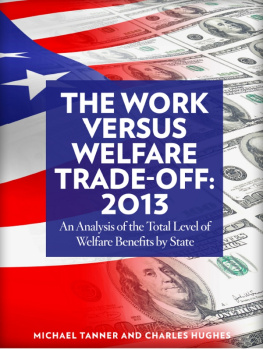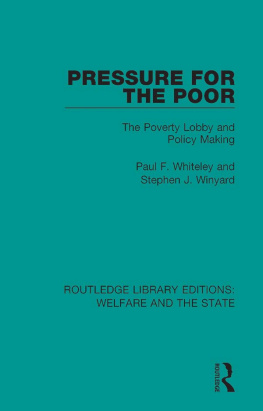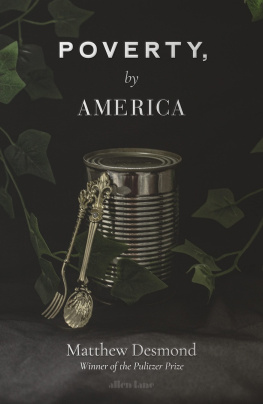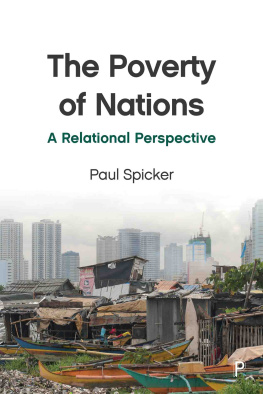Writing this book was something of a personal journey. I have studied poverty and welfare for more than 30 years. I have written two previous books on the subject, numerous studies, and innumerable columns. But over the years, I have come to believe that the issue is not as simple as some of my previous work may have portrayed it. More specifically, because my earlier work dealt primarily with government welfare programs, it was easy to focus on the failures of those programs without delving deeply into the larger questions of poverty and its causes. To the degree that I have previously portrayed poverty issues as government welfare versus pulling yourself up by your bootstraps, I was wrong. Any successful fight of poverty must deal with deeper issues, including those of race, gender, and class in America.
That does not mean that I now favor increased redistribution or government activismfar from it. As this book will show, government has generally made matters worse, both culturally and structurally. Almost every government intervention to help the poor has had unintended consequences that have actually trapped millions of Americans in poverty. Some of these interventions were malign; others were well intentioned. But nearly all hurt far more than they helped. The best thing that government can do now, therefore, is to stop doing all the bad things it currently does.
In particular, I would like to thank three remarkable women who helped raise my consciousness on issues of poverty, race, gender, and other issues. First, blogger and activist Cathy Reisenwitz challenged me to understand how privilege can distort the way I have viewed issues and weighed priorities. Given the angry and unjustified criticism that Cathy has received for trying to show that free markets and social justice are not contradictory ideas, I think it important to acknowledge how her views have helped shape my approach to this book, and, more generally, my philosophy of a libertarian approach to poverty. She is a social justice warrior in the best sense of the word, and my work has benefited from her work.
Second, Melissa Greenwald, much more than just my closest friend, constantly cautioned me against judging people without understanding the context of their decisions. Having escaped poverty herself through hard work and determination, she nonetheless reminded me that choices always existed within the contexts of upbringing, culture, and environment. She also reminded me frequently that absence of evidence is not evidence of absence. Sometimes research simply doesnt exist because our society doesnt value the results of that research. It remains important, therefore, to try to fill in those gaps.
And, finally and most important, my wife, Ellen Maidman-Tanner, never ceases to remind me that behind all the studies and dry statistics are the lives of real people. Ive written similar words in regard to other books, but this statement has never been truer. Ellens love, support, encouragementand critical reviewwere essential to the completion of this book, as they have been for all my work. Whether I was bouncing ideas off of her or relying on her editing skills, she has been part of this research from the start. She is one of the smartest and most accomplished people I know, and that is reflected in this text. But more important was her refusal to allow me to stray from the fundamental goal of trying to improve peoples lives. In many ways, her commitment to making the world a better place undergirds the heart and soul of this book. Frankly, without her, this book doesnt exist.
While I am thanking people, let me acknowledge the contributions of some other unsung heroes who contributed to the research that shows up in these pages. First and foremost, I had the extraordinary benefit of working with two of the finest researchers I have known, Charles Hughes and Robert Orr. Actually, the title of researcher does not do them or their contribution justice. Their work is reflected on virtually every page. They made this a better book, both in the writing and in substance. In particular, Roberts willingness to play devils advocate, to constantly push back and challenge assumptions, narratives, and data, proved essential to making the final product as rigorous as possible.
In addition, Peter Van Doren not only championed this book when few others would, he was also an inexhaustible source of advice, and the sort of ruthless editor that I needed. Without his help, this book would certainly never have seen the light of day. And speaking of editors, this book was immeasurably improved through the diligent editing and suggestions of Jason Kuznicki, Catos book editor. I have been truly lucky to have had input from scholars as diligent and knowledgeable as Peter and Jason.
This book also benefited from the input of Cato policy analyst Vanessa Brown Calderwho had much to add in both thought and substance, especially on housing policy, where she is one of the nations leading expertsas well as our indefatigable interns, Hejin Wang, Ali Ahmed, Jacob Hyre, Colin Combs, and Brian Camilleri, who spent countless hours at libraries, scouring the internet, fact checking, and meeting all sorts of my unreasonable demands. A particular shout out to Kelly Lester, who was one of the best interns who has ever worked for me. Beyond exemplary research, she joined Robert, Vanessa, and me for some of our most productive morning discussions that helped clarify my theories of poverty.
I should also note the assistance of Jeff Miron, Catos director of economic policy, who provided both guidance and insight. And, finally, a word of thanks to my copy editor, Christine Stinson of Publications Professionals, for turning my mangled syntax into understandable prose.
Along the way, I consulted several outside readers who provided much-needed perspective from across the ideological spectrum. Among those I am indebted to are Aaron Yelowitz of the University of Kentucky, Michael Lewis of Hunter College, and Sven Larson with the American Institute for Economic Research. Their advice was extremely helpful and greatly improved this book, yet I dont want to imply their agreement with either my approach to the subject or my conclusions. That lies with me alone.
I believe that the vision offered in this book, and the policy proposals I put forward, can help offer millions of Americans an opportunity for a brighter, more hopeful future for them and their children. I hope you agree.
Michael Tanner
Spring 2018







